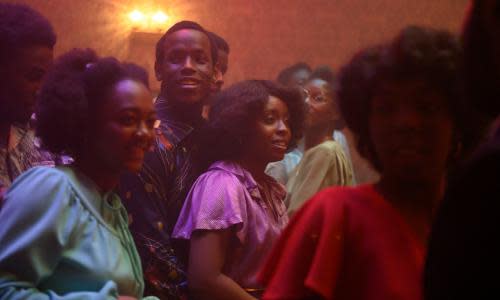Lovers Rock gives life to the joyful Black history of blues parties

At the halfway mark of Lovers Rock, the new Steve McQueen film set at a blues party in 1980, at least a hundred partygoers calmly sing an a capella song for five minutes straight. It is hypnotising and, like other moments in McQueen’s Small Axe film series, which centres around British Caribbean communities in the 1960s to the 1980s, time feels momentarily like it has been stretched. Every person in that jam-packed room patiently sings the slow song from start to finish, and everyone knows the words: “But I’ve got no time to live this lie / No, I’ve got no time to play your silly games / Silly games!”
When the film aired on Sunday night on the BBC, watching the characters sing the 1979 hit Silly Games felt very close to home, in part because Janet Kay, who sings the song, happens to be my “auntie” – a lifelong friend of my mum’s, rather than a blood relative. Silly Games was therefore a staple of my childhood; when I was growing up, Auntie Kay could always be persuaded to sing her former chart success at any birthday, christening or holy communion.
The song was part of the lovers rock genre, the post-Windrush lovechild of reggae and soul born in 1970s Britain. Silly Games was a hit at family parties when I was growing up, but it was only when I was much older that I learned the song wasn’t just a cultural touchstone in my family – it was one of the most famous lovers rock singles in history. As an adult, I started to understand its reach: I would meet Caribbeans who had grown up in Manchester, Birmingham or Scotland who had all sung the song at their family parties, too – with everyone’s mum, uncle and auntie trying to hit the notoriously hard-to-reach high note at the end of the chorus.
I grew up on fables about the blues parties my nanny hosted at her house
Many Caribbeans remarked on social media that seeing such a cherished tradition on screen felt personal – as did the setting of a legendary blues party. Usually hosted in someone’s basement, blues parties sprung up in the 1970s as safe refuges from Britain’s racist clubbing scene. As McQueen depicts, they were a mixture of an underground rave and a house party – any cash that changed hands was generally just enough to cover the costs of the makeshift shebeen. Lovers rock music like Auntie Kay’s often provided the soundtrack to these ritualistic house parties, which were all about sensual slow dancing rather than blowing off steam to pop or disco.
I grew up on fables about the blues parties my nanny hosted at her house in Hackney, east London, and those at other people’s homes that my mum spent her teenage years and early twenties attending. It would all begin in the morning: the host would spend the day painstakingly clearing out rooms, cooking for guests and getting a mammoth sound system in. The speakers were of crucial importance – and, after the party kicked off at midnight or 1am, attendees could find the right address by following the vibrations that crept along the street.
Once people arrived at the house, they would have to pay a small fee to get in, but it was worth it to find the sounds, smells and flavours of the homesick blues: curry goat, Red Stripe, wallpaper dripping with sweat and a syncopated bass line blasting from an 8ft speaker. Blues parties were places of celebration and togetherness – and crucially, the only place you could hear reggae and lovers rock, except perhaps for David Rodigan’s slot on Capital Radio.
Of course, Black spaces have always been threatened by forces outside our control. Blues parties eventually petered out, increasingly falling foul of the police due to noise complaints and licensing issues, while the mainstream clubbing scene opened up to Black audiences. By the late 1980s, they had come and gone – and today, their ghosts haunt areas like Dalston, which were once popular for blues parties but whose large basements are no longer home to Black families.
Related: Generation next: the rising stars of Steve McQueen's Small Axe
My mum disputes some details of McQueen’s retelling – notably the accents and the tactile dancing: “The art was to dance as close as possible without touching,” she told me as the film progressed. Others felt that sometimes stereotypes got the better of McQueen, who was only 11 at the time of the story. But it seemed that the millennial generation of Caribbeans in particular relished the plunge into nostalgia; and for those who have grown up on the stories of their parents, it was perhaps validating to see a lifelike depiction of historical tradition deeply mythologised yet under-documented in British history.
While it may not be perfect, McQueen’s film is a solid contribution to the ongoing project of archiving our histories, which – although it is easy to forget – are characterised by joy as well as struggle. In fact, blues parties perfectly illustrate how the two were intrinsically intertwined. Emerging from an era of “no Blacks, no dogs, no Irish”, Caribbean people carved out meaningful underground spaces to dance their blues away. Although these parties are no longer, the blues spirit lives on in oral histories, in films like McQueen’s, and in a room full of aunties reaching for that high note at the end of Silly Games.
• Micha Frazer-Carroll is a columnist at the Independent

 Yahoo Movies
Yahoo Movies 